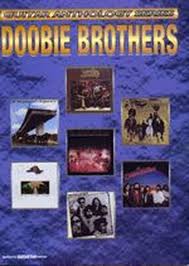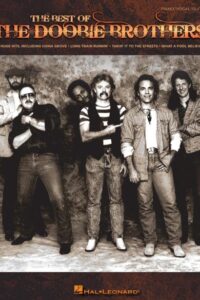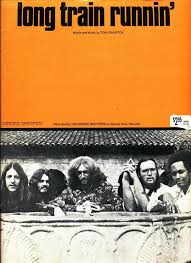Come join us now, and enjoy playing your beloved music and browse through great scores of every level and styles!
Can’t find the songbook you’re looking for? Please, email us at: sheetmusiclibrarypdf@gmail.com We’d like to help you!
Table of Contents
Doobie Brothers Guitar Anthology, with Tablature.

Contents List Download:
Best Sheet Music download from our Library.
Doobie Brothers The Best Of The Doobie Brothers

Contents List Download:
Please, subscribe to our Library.
If you are already a subscriber, please, check our NEW SCORES’ page every month for new sheet music. THANK YOU!
Browse in the Library:
Or browse in the categories menus & download the Library Catalog PDF:
The Doobie Brothers: A Fifty-Year Ride Through American Rock & Roll
Few bands in the history of American music embody evolution and endurance quite like The Doobie Brothers. For over five decades, they have navigated the shifting tides of popular taste, seamlessly transforming their sound from greasy, biker-bar boogie to smooth, soul-infused yacht rock, all while maintaining a commitment to intricate harmonies and impeccable musicianship. Their story is not one of a single lineup or sound, but a continuous journey powered by a revolving door of talented musicians, resulting in a catalog that is both diverse and distinctly their own.

The Formation and the Early “Dirty Doobie” Sound (1970-1973)
The band’s origins lie in the northern California music scene of the late 1960s. Guitarist/vocalists Tom Johnston and Pat Simmons, the group’s constant creative pillars, formed the nucleus around which the band coalesced. They were joined by drummer John Hartman and bassist Dave Shogren. The name “Doobie Brothers” was counterculture slang for a marijuana cigarette, a moniker that perfectly captured their laid-back, working-class image.
Their self-titled debut album in 1971 introduced a hard-driving, guitar-based sound steeped in blues, country, and rock. Tracks like “Nobody” and “Travelin’ Man” showcased Johnston’s gritty vocals and a dual-lead guitar attack. While the album wasn’t a commercial smash, it laid the groundwork. The critical and commercial breakthrough came with their second album, Toulouse Street (1972). With new members Michael Hossack on drums (adding a powerful second percussionist) and Tiran Porter on bass, their sound solidified. The album spawned two timeless hits: the propulsive “Listen to the Music,” with its unforgettable opening guitar riff and hopeful message, and the bluesy “Jesus Is Just Alright,” a cover that became a rock radio staple. This era, often called the “dirty Doobie” phase, was defined by tough, swaggering rock anthems like “Long Train Runnin’” and “China Grove” from the classic The Captain and Me (1973) album. These songs, built on interlocking guitar parts and powerhouse rhythms, became the bedrock of their live shows and classic rock radio forever.
A Seismic Shift: The Michael McDonald Era (1975-1982)
By the mid-70s, the relentless touring lifestyle began to take a toll on Tom Johnston, whose health issues forced him to step back from the band. Facing an existential crisis, the Doobies made a decision that would redefine them. They brought in a relatively unknown keyboardist and singer from Steely Dan’s touring band: Michael McDonald.
McDonald’s arrival was nothing short of transformative. His soulful, husky baritone voice, his sophisticated chord progressions influenced by jazz and R&B, and his songwriting prowess steered the band in an entirely new direction. The shift was evident on Takin' It to the Streets (1976), whose title track announced a new, smoother Doobie sound. This evolution culminated in their commercial zenith, the masterpiece Minute by Minute (1978).
The album was a phenomenon, dominated by McDonald’s songwriting. The lead single, “What a Fool Believes,” written with Kenny Loggins, became a cultural touchstone. Its complex narrative, sophisticated harmonies, and indelible melody earned the band two Grammy Awards for Record of the Year and Song of the Year. The album also featured the smooth, melancholic “Minute by Minute” and the groovy “Here to Love You.” The Doobie Brothers were no longer just a boogie band; they were now the kings of a new, more polished sound that would come to be known as “yacht rock.”
This era produced a string of hits characterized by McDonald’s Fender Rhodes electric piano and soulful vocals: “It Keeps You Runnin’,” “Takin’ It to the Streets,” “Real Love,” and the beautiful Simmons/McDonald collaboration “Dependin’ on You.” However, the internal dynamic had changed drastically. By the time of the live album Farewell Tour (1983), the band had decided to disband, feeling that the musical differences between the original rock sound and the McDonald-led soul direction had run their course.
The Reunion and Enduring Legacy (1987-Present)
The hiatus lasted only a few years. In 1987, prompted by the success of a charity gig, the “Doobies” reformed. Crucially, this reunion saw the return of Tom Johnston and Pat Simmons to the fold, alongside Michael McDonald for a period. The band has continued to tour and record ever since, becoming a powerhouse live act whose setlists expertly blend both of their iconic eras.
Key developments in their later career include:
Cycles(1989): A successful comeback album that featured the hit “The Doctor,” a return to Tom Johnston’s guitar-rock roots.- Induction into the Vocal Group Hall of Fame (2004): A recognition of their exceptional and influential harmony work.
- Long-awaited induction into the Rock and Roll Hall of Fame (2020): A deserved honor that cemented their status as music legends.
Liberté(2021): Their most recent studio album, a blues-oriented project recorded in Nashville.
Musical Signature and Key Members
The Doobie Brothers’ sound, across its iterations, is built on several key pillars:
- Dual Lead Guitarists/Vocalists: The interplay between Tom Johnston’s rock-and-roll grit and Pat Simmons’ more melodic, often acoustic-based style is fundamental.
- Sophisticated Harmonies: Whether the rough-and-ready harmonies of the early days or the jazz-infused clusters of the McDonald era, their vocal blends are always intricate and identifiable.
- Powerhouse Rhythm Section: The use of two drummers (most famously, the tandem of Keith Knudsen and Michael Hossack, and later, Ed Toth and Tony Pia) gave their music a unique, thunderous drive.
- Key Contributors:
- Tom Johnston: The original voice and primary songwriter of the rock era.
- Pat Simmons: The consistent melodic force and spiritual core of the band.
- Michael McDonald: The visionary who reinvented the band for a new generation.
- Jeff “Skunk” Baxter: A former Steely Dan guitarist who joined in 1974, adding incredible technical skill and helping bridge the transition to the McDonald sound.
More Than Just a Long Train Runnin’
The Doobie Brothers’ journey is a testament to musical adaptability and raw talent. They are the rare band that successfully executed a complete stylistic overhaul without losing their identity or their audience. A Doobie Brothers concert today is a celebration of American rock music in its many forms—from the hard-charging anthems that fill stadiums to the smooth, soulful ballads that defined an era. They are not just a band; they are a musical institution, whose “Long Train” is, thankfully, still running strong.
Browse in the Library:
Or browse in the categories menus & download the Library Catalog PDF:
The Doobie Brothers Discography
Main article: The Doobie Brothers discography
- The Doobie Brothers (1971)
- Toulouse Street (1972)
- The Captain and Me (1973)
- What Were Once Vices Are Now Habits (1974)
- Stampede (1975)
- Takin’ It to the Streets (1976)
- Livin’ on the Fault Line (1977)
- Minute by Minute (1978)
- One Step Closer (1980)
- Cycles (1989)
- Brotherhood (1991)
- Sibling Rivalry (2000)
- World Gone Crazy (2010)
- Southbound (2014)
- Liberté (2021)
- Walk This Road (2025)
The Doobie Brothers – Best of The Doobies, Volume I (Full Album) | Doobie Brothers Greatest Hits
Tracklist:
China Grove – 0:00 Long Train Runnin’ – 3:14 Takin’ It to the Streets – 6:37 Listen to the Music – 10:13 Black Water – 14:02 Rockin’ Down the Highway – 18:16 Jesus Is Just Alright – 21:35 It Keeps You Runnin’ – 26:05 South City Midnight Lady – 30:25 Take Me in Your Arms – 35:52 Without You – 39:31
